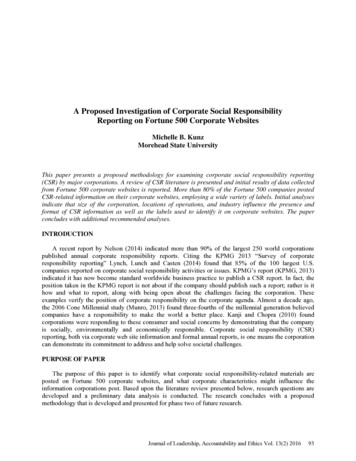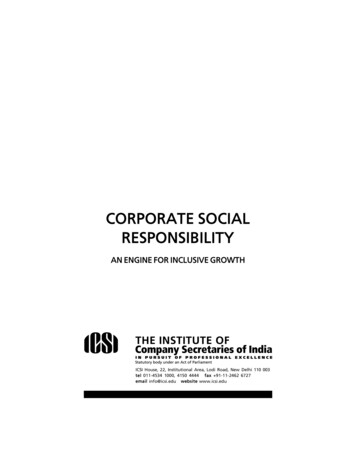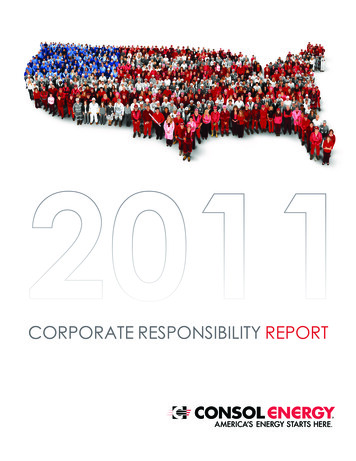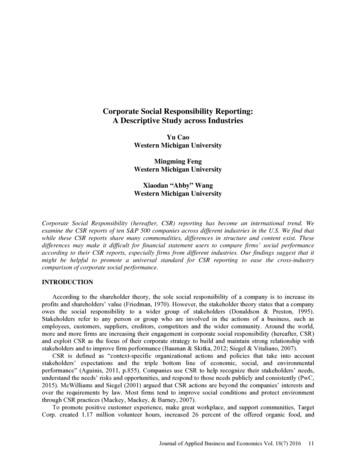
Transcription
Parikalpana - KIIT Journal of Management (Vol. 15, Dec. 2019)141Corporate Social Responsibility: An Indian PerspectiveRaja SarkarPh.D. ScholarDepartment of Business Administration, Utkal University, Bhubaneswarrajasarkar71@gmail.comDoI: ractBusiness houses cannot consider themselves solely as a money making entity.Being benef iciaries and some of the biggest consumers of various social and naturalresources, it’s their moral and ethical duty to give back to the society in variousforms. Instead of being seen only as charity, corporate social responsibility shouldbe considered as a vital part of the core business of a business entity. Companiesupon realizing this reality have started setting aside substantial portion of theirprof its for various CSR activities and Indian companies are also not an exceptionto it. There are primarily two reasons behind companies becoming more sociallyresponsible- the f irst one being the external reality of a rapidly changing societyand environment which makes it obligatory for business organizations to adoptsustainable development for their own sheer survival, the second one being theinternal reality of business innovation which makes it imperative to practicecorporate social responsibility to become more prof itable. Though a relativelynew concept in India, it has picked up pace in the last decade or so due to bothgovernment prodding and also due to the realization by companies of CSR activitiesas an excellent way to connect with the populace. CSR is not only the variousactivities companies employ to utilize their prof its for various social andenvironmental development, but also consists of the socially responsible methodsto earn these prof its and running a transparent business to realize an overallsocial and environmental sustainability. The present paper will try to explore thevarious aspects of corporate social responsibilities and will also try to assess theroles played by Indian companies in carrying out various types of CSR activities.Key Words: Corporate social responsibility, Social welfare, Sustainability, India,Environmental concernPurpose of study:India has seen an enviable growth invarious industrial sectors in the last fewdecades especially since the economicliberalization of the 90’s. Despite of that,Indian companies have a long way to goto match up to the contribution of itsforeign peers in the f ield of corporatesocial responsibility. Government ofIndia has framed various regulations toidentify diverse activities which couldqualify as acts of CSR and also set variousnorms for the same based on the bottomline of the companies. However, the real
142Parikalpana - KIIT Journal of Managementchallenge always remains the actualimplementation at the ground levelsuccessfully which could determine howf ar the effort put forward by thegovernment has borne fruit. There is aconsiderable shift of corporate goalstowards socio-economic sustainabilityto benef it various stakeholdersassociated with the business. Anelaborate analysis of CSR activities ofIndian companies will throw up variousimportant points. Thus, it is imperativeto consider this exciting relationshipbetween corporate social responsibilityand putting forward an enhanced imageof the businesses in the society.Objectives of study: To understand various rules andregulations governing CSR activitiesin India To analyze various data related to CSRactivities undertaken by companiesto give a clear idea of the status of CSRactivities in India To give out suggestions to improvethe CSR climate in IndiaMethodology:The present study uses secondary datafrom various government and nongovernment sources like Ministry ofCorporate Affairs, PricewaterhouseCoopers, Ernst & Young, KPMG etc andanalyze them to give a clear picture of thecurrent status of CSR activities in India.Corporate social responsibility:Corporate social responsibility is a selfregulating business model which helpsa company to be responsible andaccountable to the society, to itself, toits stakeholders and to the commonpeople. Through the practice of corporatesocial responsibility, companies canbecome conscious of the various impactstheir businesses are having on theeconomy, society, and environment.Engaging in corporate socialresponsibility signif ies that the companyis carrying out its business in a mannerwhich is enhancing the society and theenvironment rather than leaving anegative footprint on it.Corporate social responsibility can takediverse forms based on the organizationand industry. Businesses can have apositive inf luence on the societythrough CSR programs, philanthropicactivities, and various other voluntaryworks. It can help forge stronger bondsbetween employers and employeeswhich can boost morale of both of themby creating a special bond between themand the world around them.Corporate social responsibilityregulation in India:According to Section 135 of the IndianCompanies Act, 2013, Corporate SocialResponsibility is required for allcompanies i.e. private limited company,limited company. The followingcompanies are expected to spend 2% ofthe Prof it after tax (PAT) on CSR: Companies with a net worth of Rs.500 crores or greater, or Companies with a turnover of Rs.1000 crores or greater, or Companies with a net prof it of Rs. 5crores or greater.
Corporate Social Responsibility: An Indian Perspective143The average of last three f inancial years’PAT is considered for calculating the 2%of for CSR. These companies arerequired to form a CSR committeeconsisting of its directors. Thiscommittee oversees the entire CSRactivities of the Company. Eradicating extreme hunger andpovertyCSR committee: Improving maternal healthi) As per the Act, eligible companies aremandatedto form CSR committee ofthe board consisting ofthree or moredirectors, out of which at leastonedirector shall be an independentdirector. Combatinghumanimmunodef iciency virus, acquired,immune def iciency syndrome,malaria and other diseasesii) An unlisted public company or aprivate companycovered under subsection (I) of section 135which is notrequired to appoint an independentdirector pursuant to subsection (4)of section 149of the Act, shall haveits CSR committee withoutsuch anindependent director.iii)A private company having only twodirector onits board shall constituteits CSR committee withtwo suchdirector.iv) With respect to a foreign companycovered underthe CSR rules, the CSRcommittee shall compriseof at leasttwo persons of which one personshallbe as specif ied under clause (d)of sub-section (1)of section 380 of theAct and another person shallbenominated by the foreign company. Promotion of education Promoting gender equality andempowering women Reducing child mortality Ensuringsustainabilityenvironmental Employment enhancing vocationalskills, social business projects Contribution to the Prime Minister’sNational Relief Fund or any otherfund set up by the CentralGovernment orthe StateGovernments for socio-economicdevelopment, and Relief and funds for the welfare of theScheduled Castes, the ScheduledTribes, other backward classes,minorities and women and suchother matters as may be prescribed.Role of CSR in an organization: It strengthens relationships withstakeholders It enables continuous improvementand encourage innovationActivities permitted under CorporateSocial Responsibility (CSR) It attracts the best industry talent asa socially responsible companyThe following activities can beperformed by a company to accomplishits CSR obligations: It acts as the additional motivator toemployees
144Parikalpana - KIIT Journal of Management It ushers in risk mitigation becauseof an effective corporate governanceframework It enhances ability to managestakeholder expectationsTotal no. of CSR projects :Total amount spent on CSR:Source: National CSR Data Portal, Ministry ofCorporate Affairs, Government of IndiaSource: National CSR Data Portal, Ministry ofCorporate Affairs, Government of IndiaCSR spent: Development Sector-wise:Source: National CSR Data Portal, Ministry of Corporate Affairs, Government of India
Corporate Social Responsibility: An Indian PerspectiveCSR spent: Top 10 statesSource: National CSR Data Portal, Ministry of Corporate Affairs, Government of IndiaCSR spent: Listed vs. Unlisted companies:Source: National CSR Data Portal, Ministry of Corporate Affairs, Government of India145
146Parikalpana - KIIT Journal of ManagementCSR spent: Govt. vs. other than Govt. companies:Source: National CSR Data Portal, Ministry of Corporate Affairs, Government of IndiaTop 10 companies in India in terms of CSR spending in FY2016-17:Source: National CSR Data Portal, Ministry of Corporate Affairs, Government of India
Corporate Social Responsibility: An Indian Perspective147Amount spent by top 100 listed companies as per market capital on CSRactivities:During FY2016-17, companies have spent Rs. 7215.9 cr. which is 41 per cent higherascompared to 2014-15. This is a signif icant rise,clearly demonstrating higherexpenditure towardsCSR activities from the mandated year.Source:KPMG, India’s CSR Reporting Survey 2017Top 100 listed companies meeting the 2 per cent spending criteria:58 companies havespent 2 per cent or more during FY2016-17,as compared to only32 companies during thef irst year of requirement (2014-15).Source: KPMG, India’s CSR Reporting Survey 2017Industry wise CSR expenditure in FY2016-17:Energy and Power sector has spent the highest amount towards CSR (Rs. 2524.9cr.) followed by BFSI (Rs. 1281 cr.), IT Consulting and Software (Rs. 959 cr.),ConsumerProducts (Rs. 587 cr.), and Mining & Metal (Rs. 566 cr.).Source: KPMG, India’s CSR Reporting Survey 2017
148Parikalpana - KIIT Journal of ManagementCSR expenditure in various areas in FY2016-17:Source: KPMG, India’s CSR Reporting Survey 2017CSR expenditure by top 100 listedcompanies in education:Expenditure towards educationincreasedby over 92 per cent in FY201617 over the previous 3 years i.e. fromRs.1249 crore (FY2014-15) to Rs.2404crore (FY2016-17).Source: KPMG, India’s CSR Reporting Survey 2017CSR expenditure by top 100 listedcompanies in arts and culture:Expenditure towards arts and culturehas increased over three-fold from Rs.49crore in FY2014-15 to Rs.168 crore inFY2016-17.Source: KPMG, India’s CSR Reporting Survey 2017CSR expenditure by top 100 listedcompanies in sports:Expenditure towards sports hasincreased over three-fold from Rs.48crore in FY2014-15 to Rs.133 crore inFY2016-17.Source: KPMG, India’s CSR Reporting Survey 2017
Corporate Social Responsibility: An Indian PerspectiveNumber of CSR projects implementedin top 10 states:1249projects were implemented by top100 listed companies in FY2014-15 whichreduced to 838 during FY2015-16,whichwas considered a positiveindicator wherein thecorporates hadstarted more focused projectsratherthan spreading too thin. However,during FY2016-17, over 907 projectswereimplemented by N100 companies intop10 states, an increase of over 8 percent ascompared to the previous year.The increasednumber can be directlyattributed to the increasein CSRexpenditure during current year.149Rs.2127.8 crorefrom Rs. 1628.5 crore inFY2014-15.Source: KPMG, India’s CSR Reporting Survey 2017CSR expenditure by non-PSUcompanies:The total CSR expenditure duringtheFY2016-17 by non-PSU companieshasincreased by 46 per cent f romRs.3486 cr. in FY2014-15 to Rs.5088.1 cr.in FY2016-17.Source: KPMG, India’s CSR Reporting Survey 2017Number of CSR projects by PSU andnon-PSU companies:421 projects (22 per cent) were executedbyPSU which account for 31 per cent ofthe totalCSR expenditure duringFY2016-17. Incase of non-PSUcompanies, 1474 projects (78 percent)were executed with an expenditure tothetune of 69 per cent. It is interesting toknowthat the average project cost ishigher in case of PSU (Rs. 5.1 crore)against Rs. 3.2 crore for non-PSUcompanies.Prescribed CSR expenditure by PSUcompanies:CSR expenditure of PSUcompaniesduring FY2016-17 has increased toSource: KPMG, India’s CSR Reporting Survey 2017Number of CSR programmes byIndian origin and Non-Indian origincompanies:1800 projects (95 per cent) were executedbyIndian origin companies whichaccount for 97per cent of the total CSRexpenditure during FY2016-17. In case ofnon-India origin companies,only 95projects (5 per cent) were executedwithan expenditure to the tune of only3 per cent. Theaverage project cost ishigher in case of Indian origincompanies (Rs.3.7 crore) against Rs.2.1crore fornon-India origin companies.
150Parikalpana - KIIT Journal of ManagementCSR expenditure by Indian origincompanies:CSR expenditure by non-Indianorigin companies:The total CSR expenditure duringtheFY2016-17 by Indian origin companieshasincreased to Rs.7019.7 crore fromRs.4708.3 crore in FY2014-15.The total CSR expenditure duringtheFY2016-17 by non-Indian origincompanies has decreased to Rs.196.2crore from Rs.406.2 crore in FY2014-15.Source: KPMG, India’s CSR Reporting Survey 2017Source: KPMG, India’s CSR Reporting Survey 2017CSR compliance: Company –wiseSource: National CSR Data Portal, Ministry of Corporate Affairs, Government of IndiaMajor findings: Reliance Industries Limited isconsistently topping the chart of CSRexpenditure for the last few years The number of companies spendingmore than the prescribed 2% amounton CSR activities has seen gradualuptick over the years Companies belonging to the energy& power sector are the biggestspenders in CSR activities Health and education has receivedthe maximum attention from thecompanies regarding CSR activities CSR expenditure by companies wasfound to be highly skewed towards
Corporate Social Responsibility: An Indian Perspectivefe w sta te s ( i.e . Mah arash tra,Haryana, Gujarat, Karnataka andAndhra Pradesh) having smallernumber of backward districtsne gl ect in g s tates wi th la rgerproportion of backward districts(i .e . Biha r, Utta r P rad es h,Himachal Pradesh, Odisha andChhattisgarh. The North-eastern region of Indiareceived the least focus in CSR withminisculeexpenditurebycompaniesSuggestions: More number of companies needs tocome forward to meet the 2%expenditure criteria for CSR activitiesby setting aside funds Companies need to bring in eminentpersonalities having expertise in thef ield of CSR activities in their CSRcommittees to chalk out properplanning Rather than concentrating onsomehow spending bulk amount onCSR activities, companies need to doproper analysis to identify stateshaving large backward populationand emphasise on covering as manybackward districts as possible Government needs to be morevigilant regarding the companiesmeeting the CSR targets each yearand insist on mandatorily disclosingtheir CSR expenditure through thedirector’s report to the authorities151Conclusion:Companies are in their own waymaking contribution towardsstrengthening the CSR activities inIndia. They are addressing variouspressing issues affecting the societylike employment generation,communitydevelopment,environmental protection, easyaccessibility of healthcare facilities,creating inclusive market, etc. Lack ofcoordination among the variousstakeholders at the policy frameworklevel has remained as a majorchallenge to realize the full potentialof this activity. Involvement of thevarious stakeholders like companies,individuals, organizations, andgovernments at the state and centrallevel in a synergistic manner to utilizethe resources more effectively can helpachieve the developmental goals. Theinitiative can be spruced up by way ofproviding more clarity on the actualmeaning of CSR in the Indian contextand offering a more favourable policyenvironment. Government of India isundertaking various def initive stepsto convey to the companies thatimplementation of strategic CSR canlead to more sustainable business.A win-win situation can be createdfor all the stakeholders by way ofcreating a pool of resources bothf inancial and technical. This canlead to a holistic development for theentire society.
152Parikalpana - KIIT Journal of ManagementReferences:(2017). In National CSR Data Portal,Ministry of Corporate Affairs,Government of India. RetrievedDecember 15, 2018, from https://csr.gov.in/CSR/CSR: Top 100 listed companies. (2018, March1). TheEconomicT ted companies/articleshow/63120415.cmsErnst & Young. (2013). Corporate SocialResponsibility in India Potential tocontribute towards inclusive socialdevelopment. In . (Ed.). Retrievedf romhttps://ww w.ey.com/P u b l i c a t i o n / v w LU A ss e t s / E onsibility-inIndia/ fKPMG. (2018). India’s CSR reporting survey2017. In . (Ed.). Retrieved from 18/02/CSR-SurveyReport.pdfPricewaterhouseCoopers. (2013). Handbookon Corporate Social Responsibility inIndia. In . (Ed.). Retrieved fromhttps://www.pwc.in/ -social-responsibility-inindia.pdfSilpa, G., Ramana, D. V., & Reddy, T. N. (2017,June). Corporate Social Responsibilityof Indian IT Companies- A Study onCSR Activities of Select Companies.International Journal of LatestTechnologyinEngineering,Management & Applied Science,6(6), 18-21. Retrieved from https://w w w.ijltemas. in/mo st-viewed papers/corporate- ivities-select-companies
Corporate Affairs, Pricewaterhouse Coopers, Ernst & Young, KPMG etc and analyze them to give a clear picture of the current status of CSR activities in India. Corporate social responsibility: Corporate social responsibility is a self regulating business model which helps a company to be










